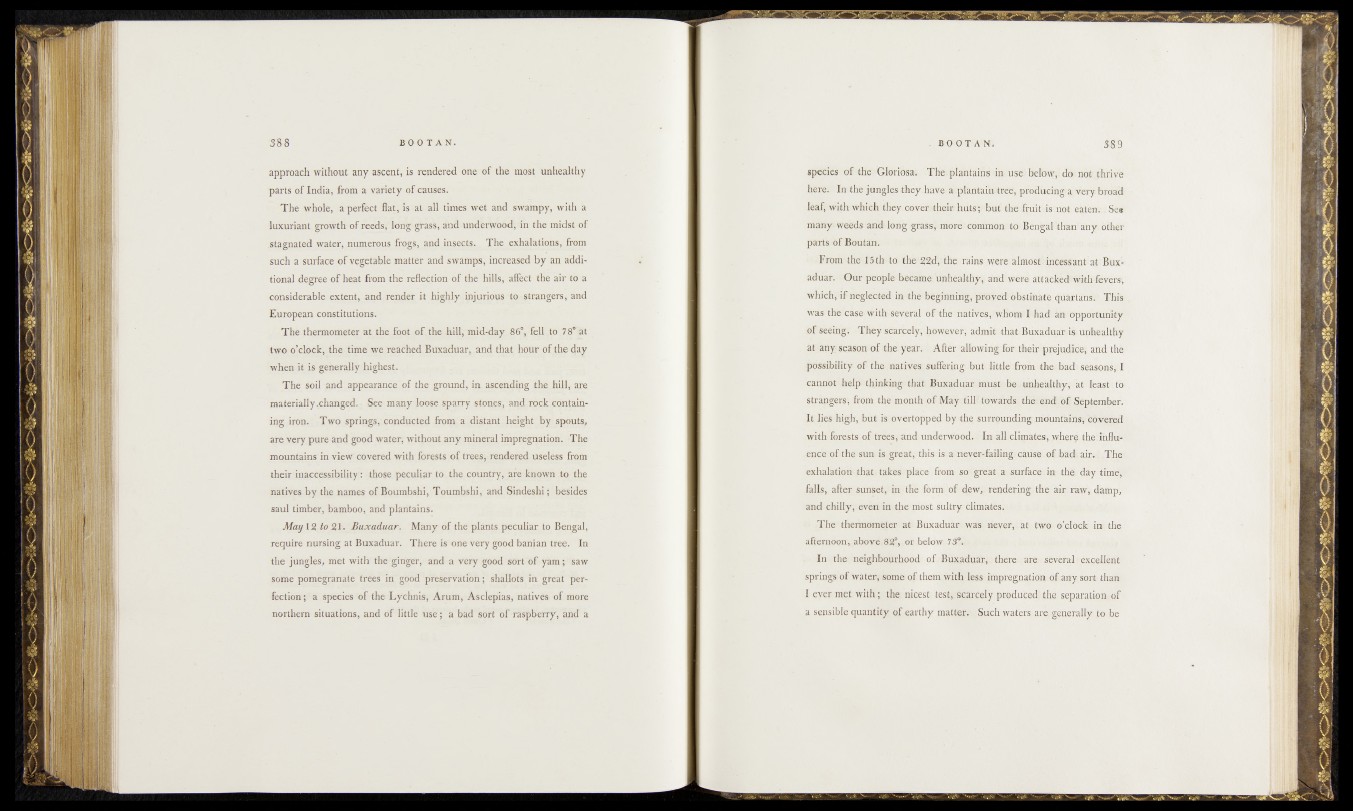
approach without any ascent, is rendered one of the must unhealthy
parts of India, from a variety of causes.
The whole, a perfect flat, is at all times wet and swampy, with a
luxuriant growth of reeds, long grass, and underwood, in the midst of
stagnated water, numerous frogs, and insects. The exhalations, from
such a surface of vegetable matter and swamps, increased by an additional
degree of heat from the reflection of the hills, affect the air to a
considerable extent, and render it highly injurious to strangers, and
European constitutions.
The thermometer at the foot of the hill, mid-day 86°, fell to
two o’clock, the time we reached Buxaduar, and that hour of^tfre ejay
when it is generally highest.
The soil and appearance of the ground, in ascending the hill,' are
materially .changed. ■ See many loose sparry stones, and, rock eqnjijin-
ing iron. Two springs, conducted from a distant height by spouts,
are very pure and good water; without any mineral impregnation. -The
mountains in view covered with forests of trees, rendered useless from
their inaccessibility: those peculiar to the country, are known to the
natives by the names of Boumbshi, Toumbshi, and Sindeshi; besides
saul timber, bamboo, and plantains.
May 1%to 2,1. Buxaduar. Many of the plants peculiar to Bengal,
require nursing at Buxaduar. There is one very good banian tree. In
the jungles, met with the ginger, and a very good sort of yam; saw
some pomegranate trees in good preservation; shallots in great perfection;
a species of the Lychnis, Arum, Asclepias, natives of more
northern situations, and of little use; a bad sort of raspberry, and a
species of the^Gloriasav iTtaftplahtains iivuse) b'elöw,. do not*^thrive
here.’ feittfre j'Ongle»|h'ey:h'avetJ'&pferttO&etried, prsofeeingfg-very broad •
leaf; with whishithey,'GoVeéjtbef®' huts ;?hut’ th&'jfrUit.is-Jrtaiii'e’^fen?:: Se*
many, weeds, andifeag .grass’! more e^AsdnSto^Bengal 'tfeuff anys olher
parts ‘hFBouta®. :
■ - From-theil 5 th«taê the >i$?dy the raifts-■ werèffalmosÊ-’friGessarïÉjait Bux-
■ aehiar-. Our people-became,'ürihëafrfey,' arfdlWêSd '
whiGh/'ifmè'glëeted in- the»bëginhirfg,'p1^e^>5&bst0ikè (juarta'nÉ' This
was ’ tMFcise-witfcsfevferOl o frfe ’natifbs, ^wfrotn • I ^adOiWripptaki.imii^-'
(#Seèingi They scarcely, however; adtaitotfettBii^a'd^ai^isiusnhfeaitffy
afcany season of .the-year.-. After alk>.win^f^fih^fiJ®i^^#lS.»d; thé'
possibility- of the-.natives suffering jfrnfedittlëffrom thêvbadiseasèrfsji'I
cannbfr help- thinking that Buxadya® must#bei-unheïdthyy;at. to
strangers, from the month of May tilPtdwards th&end;.^Soptembef.
It lies high’, bóf'isS&overtopped: bytfiq surroundingt nfeuntfririS;'c'o veraad
with-forests of trees, and underwood.In alfclftnates, yjhèy^&Éihfl^è1,.
ience Of-the- sun is great, thi'sriS$a nqverrrfriMngiGaushfvofi bad«;ai*{4te ^Tfrpf
exhalation that ■ takes place from so$gÈ^t\a«fefece<inc tM^*^y time,
falls, after sunset, in the form^of dew^trendering the air-, dkmp^
and chilly, even in the most sultry climates. - .
Thé thermömèjer‘a# Buxaduar-. was never,; at two o’clock hafctfi»
afternopni,above.81?°, or below 7
. 1» Ép^ndghtephood of Buxaduanj.. there ar®-seyefahexpefletite
springs of water, some of them{fritb less,impregna;tidn-4fianjJs®E%feh:?^|
I ever met with; thet:nicest tesfe&snar.cely pspdusecl^tli^f separat^g^cjf
a sensible quantity of earthy matteK^Spch waters ar®g$peral|gi>Q be